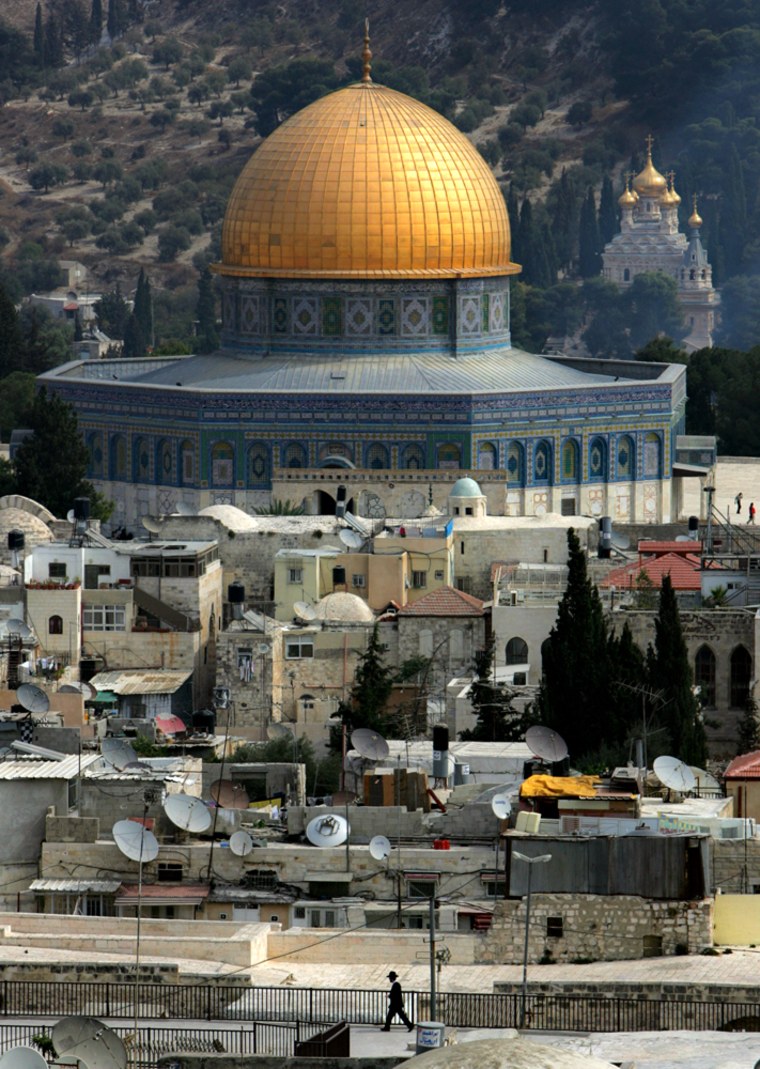Palestinian Prime Minister Ismail Haniyeh said Sunday his Hamas-led government will not recognize Israel and has problems with a widely touted Arab peace plan because it does.
International assistance to the Palestinians has dried up because the militant Hamas movement will not recognize Israel and renounce violence.
But Haniyeh repeated the Islamic militant group’s hardline principle despite the crippling Western sanctions that have bankrupted his government, led to strikes and demonstrations by public service workers and clashes between Hamas forces and police identified with the rival Fatah.
Haniyeh, addressing an “Iftar” feast at the end of a day of Ramadan fasting, said Hamas and the government “will not recognize or normalize” relations with Israel.
He also said the main problem with the Arab peace plan, presented in 2002 by Saudi Arabia and endorsed by an Arab summit, is that it recognizes Israel in exchange for an Israeli pullout from the West Bank, Gaza Strip, east Jerusalem and Golan Heights.
Haniyeh said he still hopes for a unity government with Fatah. But Palestinian President Mahmoud Abbas, who heads Fatah, said last week that negotiations have broken down. Abbas was expected to travel from the West Bank to Gaza Monday and may present Hamas a deadline for agreeing to a unity government. Otherwise, aides say, Abbas might call a new election.
Haniyeh hinted that peacemaking with Israel could be left up to Abbas. Haniyeh said the unity concept “leaves a lot of room for political maneuvering” for Abbas.
The U.S. has made it clear that the option of a Hamas-led government maintaining its militant policy while Abbas conducts peace talks is unacceptable.
The United States and Europe have insisted that any Palestinian government must accept three basic conditions before the West resumes its aid: recognition of Israel, renunciation of violence and acceptance of previous Israeli-Palestinian peace deals.
Warning from Jordan
Jordan’s foreign minister warned Sunday that Palestinians face “a humanitarian tragedy” unless peacemaking with Israel resumes quickly.
“It is absolutely necessary to consolidate international efforts to provide assistance to the needy Palestinian people,” Abdul-Ilah al-Khatib told visiting U.N. Mideast envoy Alvaro De Soto in Amman, the Jordanian capital.
Israeli Vice Premier Shimon Peres advised patience.
“In the end, (Palestinian) people will be disappointed” with Hamas’ inability to govern and turn it out of office. “Hamas let people down” by its inability to pay its workers, Peres told Israel’s Channel 10 TV.
The deteriorating financial situation and the political infighting spilled over into violence last week, killing 11 people in Gaza. Addressing 300 religious and political leaders in Gaza at a “unity and reconciliation” feast on Sunday, Haniyeh appealed for calm.
“We may criticize each other, raise our voices,” he said. “However, it is certainly our concern and religious and moral commitment that matters don’t come down to conflict, infighting and civil war.”
Isolation since March
The West imposed its aid cutoff in March, when Hamas formed a government after sweeping Fatah out of office in a parliamentary election. Since then, the government — the main Palestinian employer — has paid out little money to its 165,000 workers.
Angry workers threatened Sunday to widen their protests, paralyzing the West Bank and Gaza Strip by bringing employees of the petroleum authority into their strike and drying up local fuel supplies if the government does not pay them.
“In our hands are cards that have not been used yet,” said Ahmad Assaf, a spokesman for the Union of Civil Servants.
In violence on Sunday, two Palestinians were killed in the West Bank. Palestinian gunmen ambushed Israeli forces in a refugee camp next to Nablus, and a militant was killed, Palestinian security and the military said.
In the afternoon, a Palestinian man was shot and killed on his way to break the Ramadan fast with family, relatives said. Israeli media said he was circumventing an Israeli checkpoint. The army said it was unaware of any shooting incident in the area and its forces had not opened fire.
